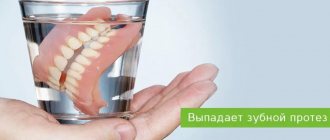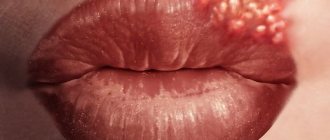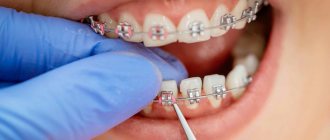Why does my tongue go numb?
External reasons
Short-term numbness of the tongue is provoked by the consumption of certain foods. The tip of the tongue often goes numb in heavy smokers. Sometimes the symptom occurs when drinking strong alcoholic drinks, in a state of intoxication. In young children, a temporary decrease in sensitivity may be caused by compression of the tongue when trying to insert it into small cavities, for example, a tube or a construction element.
Dental manipulations
The tongue becomes numb for a short time after dental anesthesia; normally, sensitivity is completely restored after a few hours. If the rules of the procedure are violated, the symptom may persist for a long time. Long-term paresthesia is sometimes observed after the removal of wisdom teeth, near which there are branches of sensory nerves.
Constant numbness often worries people with metal dentures and fillings. The reason is the interaction of several metals in a liquid medium. Under the influence of saliva, a galvanic current is produced, which irritates the mucous membrane, causing paresthesia and numbness.
Other medical effects
Taking medications with anesthetics (throat sprays, bellasthesin, which eliminates stomach pain) causes numbness of the tongue lasting up to several minutes. More severe reactions occur with the development of neurological complications of local anesthesia due to the absorption of a large amount of the drug or its erroneous injection into a vein. Numbness of the tongue and oral cavity is accompanied by dizziness, metallic taste, ringing in the ears, and tremors. Convulsions, disturbances of consciousness and speech are possible.
When performing a behind-the-ear blockade, numbness of the tongue is observed normally; it is a marker indicating that the needle has hit the right place. May persist for 24 hours after the procedure and may be associated with slight dizziness. Long-term or permanent loss of sensitivity sometimes results from operations on the ENT organs and facial structures and is associated with compression or mechanical damage to the nerves.
Numbness of the tongue
Glossalgia
It manifests itself as constant or periodic numbness, rawness, tingling, burning of the tongue. Symptoms become more pronounced during a conversation, with excitement and fatigue, and decrease while eating. The tongue and oral mucosa are not changed. Glossalgia is a functional disorder that often develops in patients with neuroses, depression, and psychosomatic diseases. Secondary glossalgia is provoked by the following conditions:
- Diseases of the digestive system
: gastritis, cholecystitis, hepatitis, pancreatitis. - Endocrine pathologies
: hypothyroidism, Itsenko-Cushing's disease, diabetes mellitus. - Damage to the central nervous system
: condition after ischemic or hemorrhagic stroke, encephalitis, meningoencephalitis, neurosyphilis. - Diseases of peripheral nerves
: sympathalgia, damage to the hypoglossal autonomic ganglion and glossopharyngeal nerve. - Connective tissue diseases
: dermatomyositis, scleroderma.
Glossodynia
Numbness, burning, tingling, itching, crawling sensation and the presence of hair are bilateral in nature, occurring on the tip or anterior 2/3 of the tongue, less often in the root area. At the initial stage, the attack lasts several minutes. Over a long period of time, the area of discomfort increases. Severe paresthesia persists for several hours; even outside an attack, patients are bothered by constant discomfort. Hyposalivation is often observed. Glossodynia is caused by:
- Gastrointestinal diseases
: colitis, gastritis, cholecystitis, pancreatitis, peptic ulcer. - Endocrine disorders
: diabetes mellitus, thyroid pathologies. - Pathologies of the heart and blood vessels
: ischemic heart disease, hypertension, atherosclerosis. - Diseases of the nervous system
: vegetative-vascular dystonia.
Desquamative glossitis
The disease may be asymptomatic or accompanied by numbness, tingling, and burning. Areas of whitish-gray plaque form on the tongue, in place of which red or bright pink smooth spots form. The affected areas quickly become covered with epithelium and are replaced by other lesions, so the appearance of the tongue is constantly changing.
Nervous diseases
Numbness of the anterior sections of the tongue develops when the third branch of the trigeminal nerve is damaged, the posterior sections are damaged by the glossopharyngeal nerve, and the root is damaged by the vagus nerve. The cause of damage is trauma, compression by a tumor or inflammatory infiltrate, or germination by malignant neoplasia. After irradiation for oncological processes, radiation neuralgia is possible. In addition, impaired sensitivity of the tongue is detected in the following diseases of the nervous system:
- Stroke.
The symptom appears suddenly, complemented by muscle weakness and sensitivity disorders of half the body, speech disorders, and facial asymmetry. - Epilepsy.
Numbness of the tongue is detected as part of the aura before partial attacks. May be combined with dizziness, weakness, nausea, drowsiness, chest pain, ringing and noise in the ears, and a feeling of a lump in the throat. - Acute encephalopathy.
The pathology is provoked by intoxications and dysmetabolic disorders. It manifests itself as numbness of the tongue, severe headache, unsteadiness of gait, vomiting, and visual disturbances. - Neurocardiogenic syncope.
The symptom occurs before fainting, lasts no more than 2 minutes, and is accompanied by nausea, dizziness, auditory and visual disturbances, anxiety, and a feeling of imminent fall.
Other reasons
The list of other pathological conditions accompanied by numbness of the tongue includes:
- Parasitic diseases
. The symptom accompanies many helminthic infestations, and is especially often found with ascariasis and acariasis. - Emergency conditions
. Loss of tongue sensation is observed in victims with delayed cyanide poisoning. Complemented by a metallic taste, pain and heaviness in the heart area. Gives way to convulsions and subsequent paralysis. - Mental disorders
. Numbness of the tongue sometimes occurs during panic attacks. Some patients with hysterical neurosis complain of paresthesia and sensory disturbances.
How does the disease manifest?
Alcoholic polyneuropathy has a set of characteristic symptoms that gradually become more pronounced:
- the muscles of the arms and legs become weak. At first, mild weakness is felt in the palms and feet, and then spreads and becomes more noticeable;
- decrease in sensitivity, its gradual decrease until disappearance;
- decrease in the severity of reflexes up to their absence;
- pain syndrome. The pain may increase gradually or be immediate and severe. Usually pain is not associated with any “external” causes (injuries, stress);
- swelling of the legs, arms;
- the appearance of goosebumps, burning, and other sensations in the limbs;
- tremors, tics, muscle twitching, finger trembling;
- problems with the cardiovascular and respiratory systems (shortness of breath, breathing problems, rapid pulse, arrhythmia);
- sweating (appears unexpectedly and is not associated with exercise, body temperature or heat);
- impaired coordination of movements, dizziness, problems with balance.
Symptoms can increase sharply after severe alcohol intoxication or binge drinking; they often manifest themselves acutely after hypothermia. In other cases, they intensify gradually, against the background of a general deterioration in health due to chronic alcohol dependence. More often, the disease develops subacutely over several weeks or months: the sensitivity of the arms or legs is impaired, and the calf muscles become painful. When squeezed, the pain intensifies. Without treatment, muscle weakness appears - up to paralysis and atrophy.
Order alcoholism treatment
We work around the clock, experienced doctors, 100% anonymous.
Diagnostics
The cause of tongue numbness is determined by a dentist. Patients with neurological symptoms are referred for consultation to a neurologist. In the absence of manifestations of dental and neurological diseases, an extensive examination is carried out with the involvement of a gastroenterologist, psychiatrist, and other specialists. To make a diagnosis:
- Dental examination.
The doctor assesses the condition of the tongue, identifies areas of epithelial desquamation, cracks, and signs of inflammation. Examines the oral cavity for other changes, specifies the type of fillings and dentures. - Neurological examination
. For isolated pathologies, curtain and pharyngeal reflexes and the excitability of the muscle fibers of the tongue are examined. For neurological diseases, reflexes, muscle strength, and sensitivity in various parts of the body are examined. - Saliva studies
. The water indicator is determined using special strips. Potential differences are measured to detect galvanic currents. The subjects are prescribed sialography and ultrasound of the salivary glands. - Other instrumental techniques
. For glossodynia and glossalgia, electromyography is performed. If diseases of the digestive system are suspected, an ultrasound of the abdominal cavity and gastroscopy are performed. - Lab tests
. As part of a laboratory examination, microscopic and microbiological examination of saliva, general and biochemical blood tests, and determination of the acidity of gastric juice can be performed.
Examination of the tongue
Content:
- What is hypotension?
- Low blood pressure - causes
- Low blood pressure - symptoms?
Arterial pressure
– the main indicator of hemodynamics, which determines the speed and volume of blood flow in all tissues. The condition refers to polyetiological pathological processes. This means that it develops due to the influence of several causes. Clinical symptoms include manifestations of hemodynamic disturbances with oxygen starvation of tissues.
Treatment
Pre-hospital assistance
In most cases, emergency medical measures are not required. Exceptions are neurological pathologies and cyanide poisoning. In case of poisoning due to parenteral administration of cyanide to a limb, a tourniquet should be applied. Victims are advised to administer amyl nitrite and resuscitate measures to maintain vital functions.
It is recommended that stroke patients be placed in the lateral position to prevent accidental aspiration of saliva and vomit. The likelihood of restoration of neurological functions directly depends on the time of treatment, so it is necessary to call an ambulance as quickly as possible. If signs of an aura appear in an epileptic, the possibility of accidental injury must be excluded.
Conservative therapy
For diseases of the tongue, sanitation of the oral cavity, treatment of provoking and supporting somatic diseases, a special diet, and sometimes psychotherapy are indicated. The drug therapy regimen includes anti-inflammatory, antihistamine and sedatives, B vitamins, iron supplements, and biostimulants. Rinsing with solutions of antiseptics and local anesthetics is effective.
For dry mouth, lubricate the tongue with a solution of vitamin A in rosehip oil. According to indications, immunomodulators and medications with antibacterial and antifungal effects are used. For patients with severe pain, nerve blocks are performed. The listed activities are supplemented with physiotherapeutic techniques: ultrasound therapy, SMT therapy, ultraphonophoresis, medicinal electrophoresis.
Patients with neurological pathology and complications of local anesthesia from the central nervous system are prescribed anticonvulsants, neuroprotectors, vitamin-mineral complexes, analgesics, antispasmodics, and vasoactive agents. If necessary, antibacterial therapy and detoxification are carried out. In case of poisoning, resuscitation measures are continued, neutralizing drugs and anticoagulants are used.
Surgery
For glossodynia, glossalgia and desquamative glossitis, surgical interventions are not indicated. The tactics of surgical treatment of patients with tongue numbness due to nerve damage is determined by the cause of the pathology. It is possible to open inflammatory infiltrates, remove tumors, and microsurgical decompression for scarring.
In patients with stroke, craniotomy, open excision, or stereotactic aspiration of the hematoma may be recommended. For epilepsy, callosotomy, hemispherectomy, lobectomy and other techniques are used. In acute encephalopathy due to arterial occlusion, carotid-subclavian bypass surgery, carotid endarterectomy, and vertebral artery replacement are performed.
Causes of alcoholic polyneuropathy
The disease is provoked by alcohol intoxication and the associated toxic effect on peripheral nerves, their damage, and metabolic disorders. There are several additional factors that cause alcoholic polyneuropathy:
- "dietary". Unbalanced, poor nutrition often accompanies alcohol addiction. The diet contains an excess of carbohydrates and a lack of vitamins. Deficiency of folic acid, thiamine, and other B vitamins slows down the utilization of ethyl alcohol and its breakdown products, which increases the toxic effect of alcohol;
- oxidative stress. With constant consumption of alcohol, excessive formation of free oxygen radicals occurs, and the activity of antioxidants decreases. The balance of pro-oxidant and antioxidant systems shifts, which causes disturbances in the activity of cellular structures, and, in particular, in the work of endothelial cells (“responsible” for the metabolic support of the brain, regeneration, tissue growth, and perform barrier functions). A decrease in endothelial activity provokes endoneurial hypoxia, against which neuropathy appears;
- direct damage to the peripheral nervous system. Occurs under the influence of alcohol and ethyl alcohol metabolites. Acetaldehyde destroys the barrier protection of the nervous system and damages the nerve fiber.
What is a panic attack
A panic attack is an attack of sudden fear and severe anxiety for no apparent reason.
The origins of panic disorder are not completely clear. However, it is believed that the disease has a genetic predisposition and more often affects the fair sex. Women are more prone to panic attacks and suffer from this disorder 2-3 times more often than men. Panic attacks cannot lead to death, despite the fact that this is the feeling that most often accompanies them. The more often attacks occur, the worse the quality of life becomes. People who have repeatedly experienced panic attacks become increasingly anxious and subconsciously try to avoid places or situations where and when they succumbed to fear. Those who have at least once experienced an attack at night subsequently experience sleep disorders.









